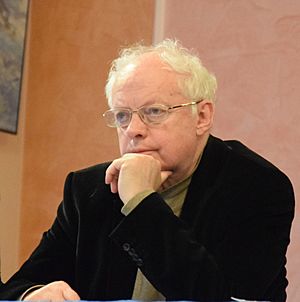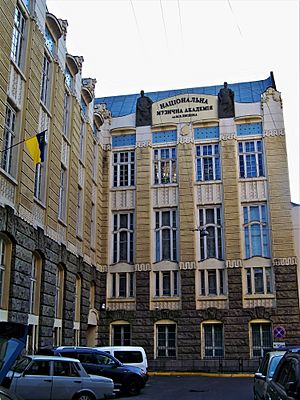Myroslav Skoryk facts for kids
Quick facts for kids
Myroslav Skoryk
|
|
|---|---|
| Мирослав Скорик | |

Skoryk in 2015
|
|
| Born | 13 July 1938 Lwów, Second Polish Republic (now Lviv, Ukraine)
|
| Died | 1 June 2020 (aged 81) |
| Citizenship | Ukrainian, Australian |
| Occupation | composer |
| Spouse(s) | Kathryn |
| Awards | |
Myroslav Mykhailovych Skoryk (Ukrainian: Мирослав Михайлович Скорик; 13 July 1938 – 1 June 2020) was a famous Ukrainian composer and teacher. His music was modern and mixed ideas from different cultures. He used styles from German, Welsh, English, and Eastern European traditions.
Skoryk was given important awards. These included the titles People's Artist of Ukraine and Hero of Ukraine.
Early Life
Myroslav Skoryk was born in Lviv, Ukraine, on 13 July 1938. At that time, Lviv was part of Poland. His parents were both educated in Austria. They later became teachers. His father studied history and cultures. His mother was a chemist.
Even though his parents weren't professional musicians, his mother played piano and his father played violin. Myroslav grew up surrounded by music. A very famous singer, Solomiya Krushelnytska, was his great-aunt. This also helped him love music from a young age.
Skoryk started at the Lviv Music School in 1945. But two years later, his family was sent away to Siberia. Myroslav grew up there. His family did not return to Lviv until 1955.
Student Years
Between 1955 and 1960, Skoryk studied at the Lviv Conservatory. He learned about musical composition and music theory. His teachers included Stanislav Liudkevych and Roman Simovych.
For his final exam, Skoryk wrote a piece called Vesna ('Spring'). It was a cantata for singers, choir, and orchestra. It was based on poems by the Ukrainian writer Ivan Franko. Other piano pieces he wrote as a student include a piano sonata and V Karpatakh ('In the Carpathian Mountains').
In 1960, Skoryk continued his studies at the Moscow Conservatory. He joined a special research program. There, he studied with the famous composer Dmitri Kabalevsky. Skoryk stayed in Moscow for four years.
During this time, Skoryk wrote many types of music. He composed for orchestras, small groups, and singers. Some of his works from this period became very popular. These include 'Suite in D Major for Strings' and 'Partita No. 1 for Strings'. His 'Burlesque' is especially famous. It is played in concert halls worldwide. 'Burlesque' is also a required piece for some piano competitions. It is also used to teach young pianists.
Teaching Career
In 1963, Skoryk became the youngest member of the National Union of Composers of Ukraine.
After finishing his studies in Moscow in 1964, Skoryk began teaching. He was only 25 years old. He became Ukraine's youngest composition lecturer at the Lviv Conservatory. He taught there until 1966. Then, he moved to the Kyiv Conservatory. There, he taught modern harmony techniques.
Skoryk wrote a book about how chords are used in 20th-century music. Many students learned from him. Some of his students became well-known composers themselves. These include Osvaldas Balakauskas, Ivan Karabyts, and Yevhen Stankovych. Skoryk taught at the Kyiv Conservatory until 1988.
He was also very active in the National Union of Composers of Ukraine. He was a co-leader of the union from 2004 to 2010.
Later Years
In 1996, Skoryk and his family moved to Australia. He became an Australian citizen. However, he later returned to live in Ukraine.
In April 2011, Skoryk was chosen to be the artistic director of the Kyiv Opera. He held this important position until 2016.
Myroslav Skoryk passed away on 1 June 2020.
His Music
Skoryk was not only a composer but also a talented pianist and conductor. His musical pieces have been performed by many famous groups and solo artists. These include the Leontovych Quartet and musicians like Oleh Krysa and Volodymyr Vynnytsky.
In 1987, he received Ukraine's Shevchenko National Prize. This award was for his Cello Concerto.
Awards
- People's Artist of Ukraine
- Hero of Ukraine (Hero of Ukraine with the Order of the State (2008))
 | Lonnie Johnson |
 | Granville Woods |
 | Lewis Howard Latimer |
 | James West |


